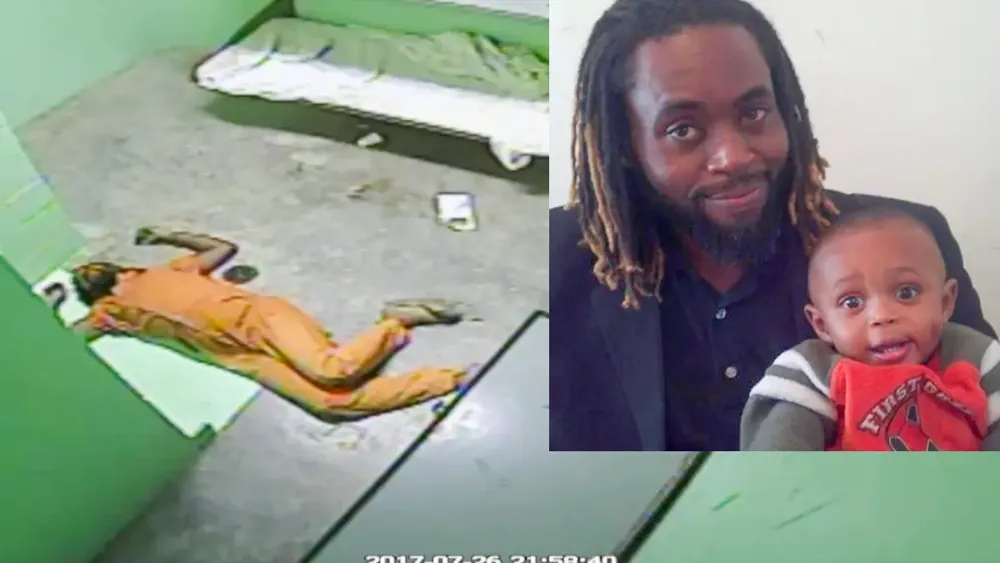‘Injustice’: Mother of Black Man Who Died In Jail After Officers Ignored His Pleas Exposes Corrupt System Lead By DA Charged In Ahmaud Arbery Case

The only person who cared that Kelsey Rayner Sr. was dying inside a Georgia jail cell in 2017 was a female inmate in the cell across from him who repeatedly told the corrections officers the 42-year-old Black man was dying as he lay on the floor of the cell, whimpering in pain. But her pleas were ignored by multiple corrections officers inside the Appling County Jail, resulting in Rayner dying a slow, painful death. The officers even shut off the intercom inside her cell so they would not have to hear her begging them to help Rayner. A wrongful death lawsuit was filed by Rayner’s widow, resulting in an undisclosed settlement. Still, the corrections officers were all cleared by Brunswick Judicial Circuit District Attorney Jackie Johnson on the basis that Rayner died of natural causes. Johnson would later be indicted for obstructing the investigation into Ahmaud Arbery’s murder. Kelsey Rayner died a slow, painful death in a Georgia jail after detention officers ignored his pleas for help. Now his mother is fighting for stronger laws to prevent in-custody deaths. (Photo: Appling County Jail and facebook.com/justiceforkelseyrayner) Since Rayner’s death, countless inmates have died throughout the United States from medical emergencies while incarcerated in a similar fashion because the corrections officers have ignored their pleas for help. Now, Rayner’s mother, Mae Joyner, has launched an organization called the Kelsey Rayner Sr. Justice for Medical Neglect Foundation Inc. in the hopes of curbing these cruel and needless deaths. ‘Disgraceful’: White Cop Who Shot Himself, Then Claimed a ‘Black or Dark-Skinned Hispanic’ Gunman Did It, Gets Slap on the Wrist for Fabricating Story “I know within my heart, if they would have taken my son to the emergency room to be treated, he would still be alive today,” Joyner said in an exclusive telephone interview with Atlanta Black Star. The organization is hosting a panel discussion on Nov. 8 with politicians, lawyers, journalists, and activists in the hopes of strengthening laws regarding medical emergency care for inmates in custody. “With this foundation, I want laws to be changed and put in place so when people are incarcerated, they can receive medical care and cannot be denied,” Joyner said. “And if they do not provide medical care, then I would like to see them arrested and replaced by someone who can and will do their duty.” Event Details: • What: Statewide Round Table & Panel Discussion • Topic: Justice Now: Medical Negligence During Incarceration • When: Saturday, November 8, 2025, 2:00 P.M. – 5:00 P.M. • Where: 5195 HWY 196 W., Hinesville, GA 31313 Contact Details for Verification: • Mae Joyner • 912 809-9098 History of Mental Illness It all started on April 16, 2017, after Rayner was arrested on charges of theft by taking after he was accused by a man who owned a local car wash of stealing thousands of dollars in car wash equipment. The following day, he was interviewed by employees from the Southeast Correctional Medical Group (SECMG), a company that contracted with the Appling County Sheriff’s Office in 2016 to provide emergency medical care to inmates who need it. During that interview, SECMG employees discovered that Rayner had been diagnosed with bipolar disorder and schizophrenia, requiring him to take medication on a daily basis. They also learned he had suffered a nervous breakdown in 2008. He bonded out of jail the following day on April 18, 2017, but just over two months later, he was arrested again on June 28 for theft of services and operating a business without a license because he had been washing cars behind a store, using the store’s water supply as well as selling produce. Rayner told police the store had given him permission, but he was transported back to the Appling County Jail, where once again he was interviewed by SECMG employees who documented his history of mental illness. He complained of chest pains and was transported to a hospital on June 29, 2017, where he was evaluated but found nothing wrong, so he was transported back to jail, bonding out the following day. And he was arrested a third time on July 15, 2017, accused of making threatening phone calls to the man who had accused him of stealing his car wash equipment. And once again, he was evaluated by SECMG employees who documented his struggle with mental illness and his need to take medication. They also noted he had a temperature of 99.9 degrees, which is bordering on a fever. Five days later, on July 20, 2017, he complained to SECMG employees that he was experiencing stomach and back pain, but they did not conduct any blood or lab work. On Monday, July 24, 2017, Rayner was taken to court, where he pleaded guilty to the misdemeanor charges he was facing. The judge sentenced him to a year in jail, but that sentence was suspended upon completion of 12 months of probation. He also asked the judge for help with his growing health issues. And I've been using the bathroom, passing blood and all that, too,” he told the judge, according to the lawsuit. "They were supposed to take me to the hospital after that, but they didn't. I really need my body checked out, Mr. Pres. Whatever you can do to help me get out, I'd appreciate it.” Ignoring a Dying Man But he was returned to jail despite being placed on probation, which the claim states was “unlawful,” where his health began further deteriorating, where he was unable to eat and was in so much pain, he knelt down with his head and elbows on the floor. The following day, on July 26, 2017, he began vomiting repeatedly and was curled up in the fetal position on the floor of the jail cell. And numerous officers walked by his cell, spotting him on the floor but making no attempt to help him. At one point, two officers entered the cell and touched him to see if he was still breathing, only to walk back out of the cell when they saw he was still alive. Meanwhile, the woman in the cell in front of his cell realized he was dying and did all she could to save him, the claim states. During Mr. Rayner’s last few hours, his cries for help, moans of pain, and obvious distress led the inmate in the segregation cell across the hallway, Latasha Denise Smith, to repeatedly use the intercom in her own cell to call the corrections officers in the tower for assistance to him. She repeatedly told the officers in the control tower that Mr. Rayner was dying and that they needed to take him to a hospital. Her complaints were so frequent and bothersome to the officers in the control tower that they disabled her intercom button and prevented her from making any further verbal complaints. After her intercom button was disabled, she employed other methods to try and get the attention of the officers in the control tower, at one point taking off her bra and waving it in front of the camera in her segregation cell to get the attention of the corrections officers in the control tower. Despite the complaints of Ms. Latasha Denise Smith, the corrections officers in the tower made no effort to provide medical assistance to Mr. Rayner. But despite not offering him assistance, they still would walk by his cell while he was on the floor dying. It was only when he stopped breathing that the officers contacted an ambulance. Death Could Have Been Prevented An autopsy determined he had died of sepsis after his colon had ruptured. The Mayo Clinic describes sepsis as a “serious condition in which the body responds improperly to an infection.” But despite it being a serious condition, a person can survive if receiving the proper treatment in a timely manner. “The infection-fighting processes turn on the body, causing the organs to work poorly,” according to the Mayo Clinic. “Sepsis may progress to septic shock. This is a dramatic drop in blood pressure that can damage the lungs, kidneys, liver and other organs. When the damage is severe, it can lead to death.” “Early treatment of sepsis improves chances for survival.” Following Rayner’s death, the Georgia Bureau of Investigation began an investigation into his death, but that investigation was shut down by Brunswick Judicial Circuit District Attorney Jackie Johnson, according to Joyner, Rayner’s mother, who is still seeking justice. In 2021, Johnson was indicted on charges that she attempted to obstruct the investigation into Ahmaud Arbery’s 2020 murder, the Black man killed by a white father and son while jogging. However, she was cleared of those charges earlier this year. Johnson was voted out of office in 2020 after she was beaten by Keith Higgins, who promised Joyner he would reopen the case on her son if elected – but that turned out to be a lie. “He said he would reopen it if he won and have a special D.A. appointed,” she said. “Or if he didn't win, he would make sure that they would get a special D.A. to reopen the case.” “It never happened.” Watch the graphic video below of the moments before he died.

